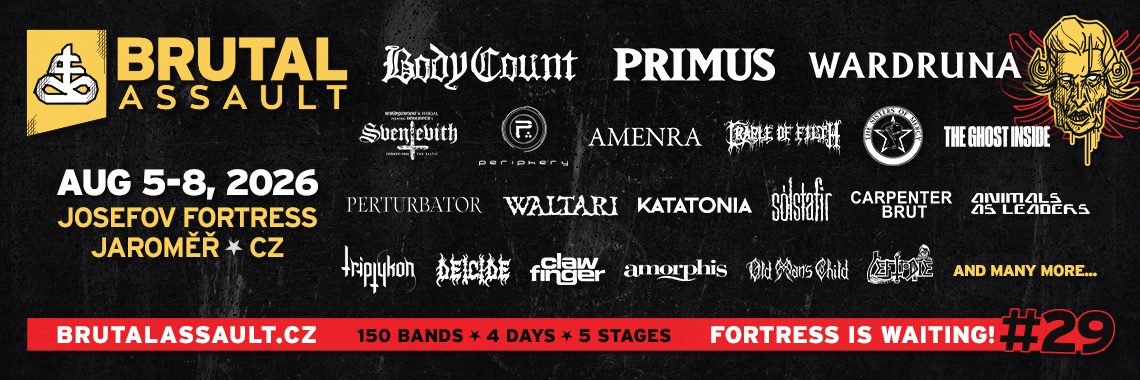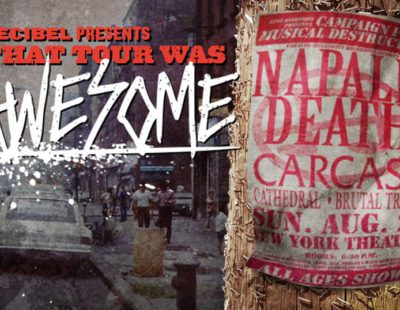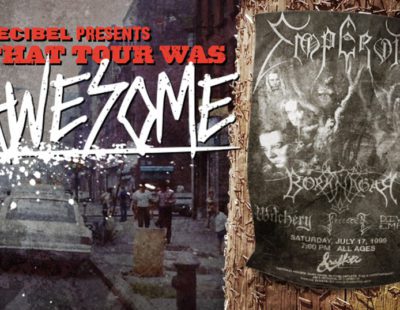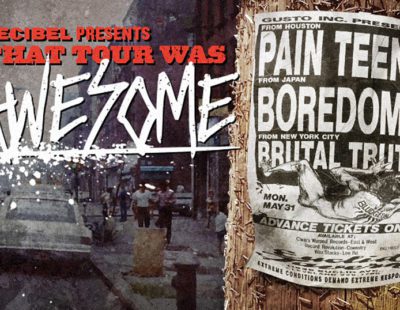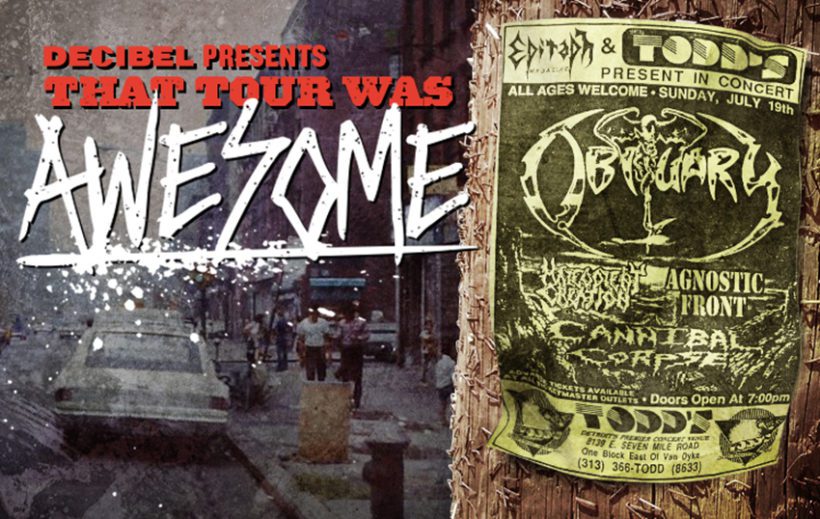
The idea of getting Obituary, Cannibal Corpse and Malevolent Creation out together on a tour in 1992 is awesome but not altogether surprising—death metal was booming and those three bands were all on fire, so it would make sense to have them go tear it up on the road together. But to add in hardcore legends Agnostic Front as the fourth band? That’s when things got crazy.
Musically, it worked, and the bands all got along. It’s when the Nazis showed up that the trouble started.
We caught up with Obituary drummer Donald Tardy, then-Cannibal Corpse guitarist Jack Owen, then-Malevolent Creation bassist Jason Blachowicz, and Madball vocalist Freddy Cricien (who filled in for Agnostic Front vocalist Roger Miret on this tour as Miret had to have an emergency operation; Cricien is Miret’s younger half-brother) to talk about what went down on Complete Control.
Read on to find out how the three death metal bands and the NYHC crew formed a lifelong bond, how much money an extreme metal band member was expected to live off for a day in 1992 on a tour we now look back on in reverence and the chaos that went down in Miami.
What do you recall about how the tour came together?
Donald Tardy: It was awesome, because after Slowly We Rot came out and the success of Cause of Death, The End Complete was definitely one that the metal world was looking at, for sure. The record label knew that it was a big album, the release was awesome, we then put together that tour, which, who would have guessed it was going to be as big as it was? Because, again, it was so long ago, to think that Malevolent and Agnostic and Cannibal and Obituary all were on the same tour together, it’s pretty unbelievable that it came together that way. It was an American run, I remember it was quite a long tour, I think it was probably 25-plus shows, nearly five weeks out, and back then, that was before cell phones, back before there was internet, so the world was still innocent and pure. That was quite a while ago that we made our mark in America, and obviously became really good friends with those bands, and it’s been a lifelong friendship with those dudes. It’s funny, because I can’t remember one performance or one venue, but I definitely remember the camaraderie, the friendship that we got with the Agnostic Front guys, and of course Cannibal and Malevolent are still super good friends of ours. It was just awesome.
Freddy Cricien: Honestly, I was not involved in the process of how it came to be. At all! I was a roadie, for lack of a better term [laughs]. I thought it was crazy that it was all death metal bands and then Agnostic Front. I wasn’t super familiar with that scene, so I was curious how it would play out. It turned out to be pretty awesome. In hindsight, it said a lot about AF and their influence in heavy music overall. Someone thought to put these bands together and all the bands were very excited to have them on board. A lot of respect was shown and the band really appreciated that. It was a good opportunity for both scenes to mix. It didn’t always go as smoothly as everyone wished… We’re talking the early ’90s! Still, it was a cool experiment and the first tour of its kind. We made a lot of new friends, and we’re still cool today, especially in the Obituary camp. I became a fan of theirs on that tour. What I witnessed was historic, in my opinion.
Jason Blachowicz: We had a new album out at the time, Retribution, and we ended being invited onto a bad-ass tour with Cannibal Corpse, whom we shared a bus with, Agnostic Front and Obituary. What a fuckin’ tour that was. What memories!
Jack Owen: I think it was based on New Titans on the Bloc, which was, I think, Napalm Death and Sick of It All and a couple other ones; everybody wanted to do a death metal version. So that all came together, I think, through labels back then. Roadrunner and Metal Blade.
Freddy, now, your involvement here is obviously a bit unique… how and when did you get on the tour?
Cricien: Like I said, I came on board as a “roadie.” I was there to help in whatever capacity I could. Obviously, I ended up doing a bit more [laughs]. I was there from start to finish.
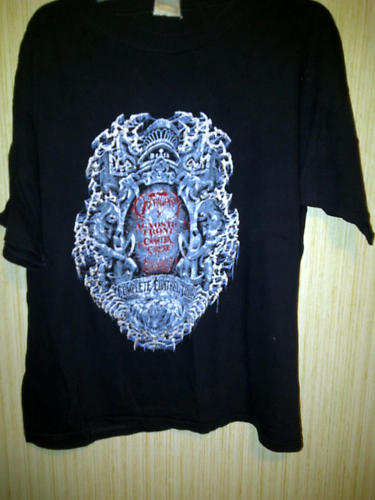
How big were the shows and venues?
Owen: I would say smaller theatres up to, like, medium theatres.
Tardy: That was early ’90s, and that was when venues and fans were pretty manic, so it was easily 800 to 1200 people a night, which doesn’t seem like that big, but for any band nowadays that’s Obituary-size or somewhere around there, to pull 1200 people each night would be miraculous. So it was huge; it was definitely huge. We were all super young and not just starting but definitely just beginning our journeys through a career of music, so I learned a lot on that tour, and still use some of that knowledge today when I go to tour, because it’s fun being on stage for the one hour you get to play, but the 23 other hours that you’re dealing with living out of your backpack, living on airplanes and tour buses and van rides and stuff, that was all a big part of the learning process for all of the band members and all of the bands. It was cool, and, again, it was back before there was an internet and before you could advertise so easily, so the fans definitely had an eager want to see all these bands and it definitely showed with the attendance, because it was amazing.
Jack, what was the status of Cannibal Corpse at the time? Tomb was recorded but not yet released, is that correct?
Owen: Yeah, I remember we opened with a lot of Butchered at Birth material, like “Covered With Sores” was our opener. Yeah, Tomb was recorded, [guitarist] Bob Rusay was still in the band. We were just kids. We had done a couple tours in Europe, we did the Atheist tour with Gorguts in early ’92. This tour was long, like July into September. It was the first time we shared a bus, well, in the US; we shared it with Malevolent Creation. That was the main thing of the tour for me, just the camaraderie between us and Malevolent. Most of those guys were from Buffalo, except [Malevolent Creation drummer] Alex Marquez. We took our Sega Genesis on tour, I think we played Sega hockey like all day in the bus, and if we had a hotel, we took it into the hotel with us, too. Us and Malevolent [laughs]; everybody had their signature moves, just get drunk and play Sega hockey [laughs].
Freddy, how did this tour contribute to what you were doing in Madball?
Cricien: Madball was in its infancy, to be honest. Technically we were a “band” but really we hadn’t started making the rounds yet. We had a release out called Ball of Destruction that came out in 1989 (when I was literally a kid) and that was sort of a novelty thing. Fast-forward to ’92—I can’t even remember if we had recorded Droppin’ Many Suckers yet… that was our second release, an EP as well. It was recorded in ’92 and released in either ’92 or ’93? So, no one outside of the HC scene had probably even heard of MB. Even within the HC scene, I don’t know at that point how seriously we were being taken; we were just getting started. In ’93, we became way more active and so on moving forward. This tour was a good “training grounds” situation for me. It was very humbling. I was furthering my education of what it entails to be a “frontperson.” It took many, many years, even after this tour, to get semi-comfortable up there. That’s been more so in recent years. It definitely helped me with MB, though; it gave me a lot more confidence on stage. I was very green.
Jason, what was the vibe like in Malevolent Creation at this point in time?
Blachowicz: We were on fire! Retribution was hands down the best album ever recorded by the band. I was sad to see that lineup fall apart, and the lineup changes continued throughout the band’s struggling career by becoming a revolving door for death metal musicians coming and going, returning, quitting, firing, revamping… I always wondered what it would have been like if we wrote another album with that same amazing lineup…

Donald, looking back, it must have been a really exciting time for Obituary. The End Complete was out and you were on this pretty big headline tour. When you think back on that time in your career, what do you think of just in general?
Tardy: I think we were all still just kind of figuring it out. Slowly We Rot came out so early that we didn’t even really tour because we were still just becoming a band. So by the time The End Complete came out was when we just started learning what touring was going to be. We were so young we didn’t really care; we just went for it. But by the time The End Complete came out in 1992, we then had an idea that, wow, we are a band that’s actually making a pretty big stink in the music world, and we can really push this hard, and we did as a band. That tour [was] the learning process of how to be a band, how to be a good band member, and being responsible enough to not get left behind and miss shows, lose passports, or just become a complete idiot and get fired from a band. It was one of those things where it was a learning process but it was a great experience just to figure out that it’s awesome being on stage together, but it’s that travel, living together, you’re basically married to four other people in your band and you have to make that work for it to be successful and somehow we now, 31 years of doing it, we’re super lucky that we genuinely like each other, and we still have a great time doing it because, again, we just like being around each other in general, and we’re good friends, still, which is pretty amazing.
I have very fond memories of that era, including getting The End Complete on cassette.
Tardy: It was exploding right then. ’92, ’93, ’94. It’s hard to believe it was that long ago, but it just shows how fast time is flying and how fast our lives are going by us. We were all super young. It’s funny meeting people who are like, “I grew up to you guys,” and they’re really not that much younger than I am, but it makes me realize I grew up to me. We were just kids when we started writing these first albums. So by the time ’92 was here and The End Complete came out, it definitely had people looking at us, and the American fans were catching on. Everyone knows, back in the early ’90s everyone kinda said, well, it seems like Europe’s huge and all the festivals, and finally you could see the recognition of American bands with American fans was coming around, for death metal anyway. I know obviously heavy metal has been around for a long time, Judas Priest and Iron Maiden, but to see death metal fans really come out in the masses and have such successful tours, especially with a New York hardcore band like Agnostic Front, it was just super cool. I think it was groundbreaking, whether we knew it or not, because those types of fans normally, they’d get along, but they just didn’t probably think they would get along. But that tour definitely proved that the hardcore kids and the real death metal fans can actually coexist in a venue together without there being fights or anything and actually enjoy each band as they were on stage.
That was going to be my next question: there’s kind of a black sheep band on the bill, being Agnostic Front. So how did they go over with the metal crowds?
Tardy: I think it was awesome. Again, it was so long ago that I don’t think anyone was too opinionated quite yet. Everyone was young, even the bands and the fans, we were all just 20-something-year-olds, and I think the fans were just happy to have a diverse package like that. Back in the day, when Slayer would come to town or have a band opening for them, Slayer fans were Slayer fans back then, they could care less who opened, but the death metal fans really seemed to like the idea that we weren’t just on tour, but they could also tell that we were friends, we made it work, we shared buses and venues and backstage rooms together, and we kinda proved to them and proved to ourselves that it does not have to separated and segregated. This is metal music. It might not be death metal, but Agnostic definitely was heavy and killer and had a lot of groove, and how couldn’t you like it when you saw it? Just a really great band.
Owen: Great with us, because they were a great band, and we had a lot of respect for Roger [Miret], the singer, because he was a veteran at that point, and [guitarist] Vinnie Stigma, everybody loved him, so everything worked out band-wise, and friendship-wise. There were problems with skinheads coming out; I remember in Miami, that was the worst case of Nazi skinheads. They were fighting with Obituary, for some reason. I remember Trevor [Peres, Obituary guitarist] was holding them back with his guitar because they were rushing the stage. I’m not sure who started the fight, but Trevor was just sticking his guitar down into the crowd of Nazi skinheads. So I’m sure some of them are scarred up from that. Which is fine; they’re the lowest form of life.
Blachowicz: Agnostic Front are one of the best live bands ever! Period! Super cool guys, to boot. After our label at the time, Roadrunner, and bus left us stranded in Arizona after the tour, Roger was kind enough to help us out with some money for a way home. Their shows were an epic part of the tour, with some of the sickest pits I’ve ever seen!
Cricien: They were definitely the black sheeps of the tour! I think that played in their favor, though, because they really stood out. They went over really well. It was harder to tell when I was fronting them because I was just nervous and trying to get through it. But as a spectator and fan, I watched a lot of metalheads become very impressed with what they were witnessing. They for sure gained fans and I think the same happened with the death metal guys. A lot of HC kids became Obituary fans after that tour. Also keep in mind, AF did have supporters there at every show so that helped the vibe.

Donald, you mentioned there not being a lot of fights. From looking around online, I actually saw people saying there were lots of fights on this tour between audience members, the hardcore people and the metal people clashing. Do you recall any fights?
Tardy: I don’t really recall anything that was show-stopping. There’s always going to be some ignorant person in the crowd no matter what, and also the people that try to live that style of death metal or nothing or hardcore or nothing, you’re always going to have that person. But in general, I think death metal fans kind of dug it and we opened up a lot of eyes and Agnostic opened up a lot of eyes when they played in front of death metal fans. Then the same thing with Obituary: I think a lot of those New York hardcore fans were probably pretty close-minded when they were walking into the venue wondering what these bands were going to be like. I can’t speak for Cannibal or for Malevolent, but I know for a fact that when we were done with our performances, we had a lot of people who said, “I didn’t think I really liked death metal but you guys have groove and it reminds me a lot of what Agnostic’s doing or what Sick of It All’s doing,” and some of the drumbeats and stuff were definitely right up their alley, whether they knew it or not. Looking back, we then wrote the World Demise album, and if you listen to that album, there’s definitely some influence. I don’t think I meant to, I was too young to really try to calculate it, but looking back now there’s definitely some of that groove that I probably got influenced from Agnostic on the tour the year before we started writing World Demise. It was just a super cool experience. What a great year for music, and I just really, really appreciate the idea that we have lifelong friends, because every time we see them dudes it just seems like it was just yesterday. It’s been decades now, but we’re still super good friends.
Blachowicz: Not really, I was too busy onstage bangin’ my head to the furious pits that erupted every night! Actually, sometimes it was the security at the venues that was the problem—big gorillas beating on young kids who were just having fun moshing!
Owen: Other than Miami, I don’t remember any clashes like that. We all get along. Sick of It All’s bassist has said that metalheads have money, punk kids don’t have any, so there’s always a merch sales discrepancy. “They bring their parents’ money; punks ain’t got no money.”
Cricien: The amount of fights were probably exaggerated, but I’d be lying if I said there were none. The tour had its share of clashes and disagreements [laughs]. Unfortunately. Again, it was the early ’90s and there was still a lot of ignorance with regard to scenes mixing. believe it or not. In the bigger cities, not as much. It was more prevalent in the smaller cities, towns, etc. I think bigger cities were already getting a taste of this kind of stuff. In NYC, metal and HC shows weren’t totally uncommon. Not to say there wouldn’t be violence sometimes… It was all part of the learning process.
Freddy, Jack from Cannibal Corpse was telling me about a particularly rowdy show in Miami, when Nazis showed up and caused trouble. Do you recall that?
Cricien: I don’t doubt it! I don’t remember anything specifically. There were some fights for sure at that show… it was a wild one. Funny thing is, there is a big Latino contingency that comes to HC shows in Miami… it’s actually a really mixed race crowd. Not the best choice for a Nazi. Sadly, that element sometimes creeps its head in at both HC and metal shows. They weren’t welcomed by anyone on the tour, that I can assure you… There were a few states where those guys popped up. It didn’t always translate into a fight but no one ever felt comfortable with that element around. I think the crowds for the most part let them know it wasn’t cool. In other areas, they were maybe more subdued or quiet about it, so it was “tolerated.” That shouldn’t be the focus of this tour, though. It was a special tour on many levels!
Blachowicz: One sentence for my brother in metal and long-time friend Jack Owen: “In the woods baby!” [laughs]
Was that because of Agnostic Front, the hardcore element there, drawing those kinds of people? Why were they coming out to this tour?
Owen: I think there were a few more because of Agnostic Front; you would get a few here and there on a death metal tour. Agnostic Front certainly wouldn’t want them there, but they’re coming out anyway. There’s not much you can do.
How did all the bands get along? I’m assuming everyone got along smashingly?
Tardy: Yeah, we did, and it was cool. We didn’t know… Agnostic was around even longer than Obituary, so we were going into it kinda blind. I was pretty shallow when it came to my style of music as a teenager, especially when it came to New York hardcore or anything like that, or even death metal. I was so into southern rock but also Slayer and Black Sabbath and stuff… I didn’t have any idea how it was going to go, and those guys couldn’t have been any cooler, just genuinely nice people once you got to know them, and like family by the end of the tour. We were like family… I cherish that tour, but cherish having friendships like that with those guys, for sure.
Cricien: Bands got along great! Those guys were uber respectful and it was reciprocated. AF will get along with most anyone if treated with courtesy and respect. Same with MB, for that matter. There was never any posturing amongst the bands, contrary to what some may think. Everyone got along very well and friendships were made on that tour. Ones that stood the test.
Blachowicz: Everyone became family! It was the best tour and summer of my life, we were all in the peak of our musical careers and touring like rock stars on a big ol’ bus with Cannibal, who we grew up with in Buffalo when we were teenagers. And even though we made no money, we were fed, traveled in a nice bus and were havin’ the time of our lives! Partying, groupies, drugs and alcohol; it was amazing!
Owen: Great. I think we knew Obituary from hanging around Morrisound and Malevolent from, geez, we used to jam in the same building in Buffalo as them, or some of them. So there was a Buffalo element and Alex Marquez from Miami blended right in. Man, he was a character. He didn’t make a cup of noodles, he made a pitcher of noodles; he was pretty big back then. You’d look in his bunk and there’d be a pizza in there. We got $5 a day per diem for food, and his famous quote was “Dude, $5 will feed your skinny ass.”
Was $5 a day manageable?
Owen: Not really. I don’t think we ate much. A package of baloney and a loaf of bread. And the club will just always make spaghetti.
Any other wild stories you recall from this tour?
Owen: On the last day of the tour, the bus company pulled the bus for non-payment. We got everything out pretty much but Jay had his bass cabinet in one of the luggage bays, and the bus is pulling down the street, and he’s still in the bay trying to get his bass cabinet out while the bus is rolling [laughs]. Somehow my boots were in the street; they were steel-toed, and the bus ran over them and flattened the steel toes. Phil [Fasciana, Malevolent Creation guitarist] said they saved those and kept them on the dresser in their hotel room as a souvenir [laughs]. I don’t remember how we got home; we didn’t have a bus. I think Metal Blade probably hooked us up with a bus, as usual, back then.
Looking back on this tour, what was its importance to your band?
Tardy: I think it was just reassuring us that we were a solid band. This was a tour that proved to us that we belong in this business, and we are making a big stink, and we are proving ourselves. We didn’t even know that, but once the tour was going and once we saw the fans and how successful it was, it really just reassured us that we’re doing the right thing with the style of music that we want, and let’s keep pushing forward believing in ourselves. Cause of Death and Slowly We Rot definitely were the roots to the tree, but The End Complete came out and it really made that tree grow and have a very big base to put a career around, and The End Complete was definitely the album that made us believe we are doing the right thing with this style of music and our fans were telling us the same thing: don’t look any direction but yourselves because we love what you guys are doing, and that’s really what I took from it.
Cricien: I feel from a somewhat outside perspective, it was a very important tour for AF. It really helped bridge some gaps, even if and when there were some bumpy roads along the way. AF is one of those bands that gets a lot of respect from the metal world and it wasn’t the first time a HC band played with a metal band, but it was the first HC-meets-death-metal tour and it set a precedent, I think. It helped demonstrate that it was okay for both scenes to branch out and be more diverse… play to other folks! You’re not less HC or less death metal [laughs]. This is especially true for HC because “we” are more close-minded as a scene. That has changed some and continues to, thankfully. There was a lot of mutual respect and bands just doing what they do in front of some different people. Both scenes are underground and I think everyone benefited from it—the bands and those who participated. For myself, I took away a lot from that tour. Stage-wise, it helped me grow. It was like playing for the pros for a season, straight out of high school. I was awkward as hell and not at my best vocally. Still, I learned so much; it was a priceless experience that I’m eternally grateful for. Even if I didn’t always show it then! It also showed me that it’s okay to branch out, and with MB I never shied away from playing with any other style band when given the opportunity. We are who we are and nothing will change that! It’s okay to diversify your audience, to grow and evolve and still keep your integrity. I am honored to have been a participant. RIP Frank [Watkins, Obituary bassist] and Big Brett [Hoffmann, Malevolent Creation vocalist]!
Blachowicz: It put us on the map! In the world of death metal, the response we received for Retribution was overwhelming from everyone: bands and fans, road crews, reviews… Retribution was hands down the highlight of our entire career! As Brett Hoffmann would say, “Retribute your malevolence handed down!” Rest in peace, my brother; it was an honor to tour the world with you! Peace.
Owen: Oh, it was huge. Just the length of the tour, the exposure, of course. I liken it to the Obituary/Sadus/Sepultura thing; that was one of my favorite tours. Hopefully it was along those levels of, everyone has to go see this when it comes to town. There wasn’t a lot of tours like that back then. They’d do them in Europe, where they would put like five or six killer bands together for kind of a festival tour, but back then it was like, headliner and grab some openers… That was a huge package. Everybody flew to Puerto Rico for one show. You’ll have to ask Alex [Webster, Cannibal Corpse bassist] about the pyro they didn’t tell us about [laughs]. That’s usually something you’d want to tell the band about. I think it blew up, like, behind or next to Alex [laughs]. Just one pyro. Agnostic didn’t make that one, but they took the other three bands. That was a riot.
Did you miss a beat when the pyro went off?
Owen: I don’t think so, no.
Any final thoughts looking back on this tour?
Owen: The big [hurricane] that hit Miami… Alex, and Dennis Munoz was there, and they’re from Miami, so they were monitoring that. I think their rehearsal space got destroyed during that.

